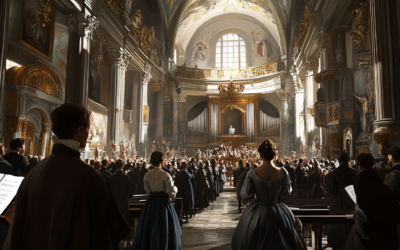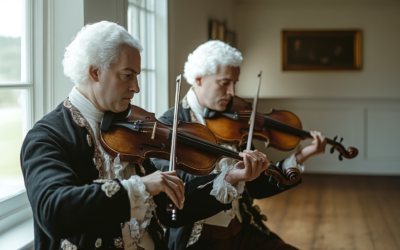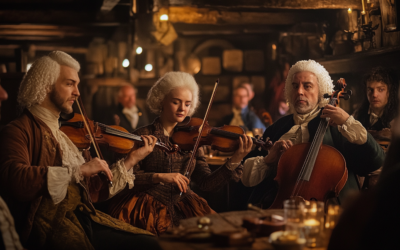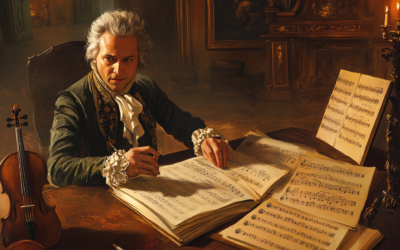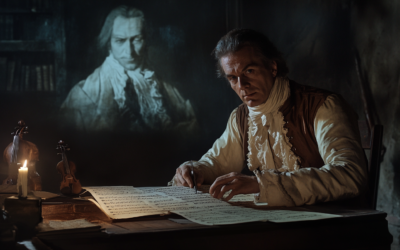A Questionable Canon
The Misattribution of Mozart’s K.2 89a (K.6 73i)
K.2 89a (K.6 73i) is no grand work of genius, but rather a simple canon exercise for four sopranos. Its problems range from missing voices and unresolved harmonies to a lack of text, suggesting it’s a poorly copied version of an earlier work.
Modern editors have tried to patch it up, but can we really still call this a work by Mozart? It’s time to question whether it belongs in his catalogue at all.
Mozart: The Fall of the Gods
This book compiles the results of our studies on 18th-century music and Mozart, who has been revered for over two centuries as a deity. We dismantle the baseless cult of Mozart and strip away the clichés that falsely present him as a natural genius, revealing the contradictions in conventional biographies. In this work, divided into two parts, we identify and critically analyze several contradictory points in the vast Mozart bibliography. Each of the nearly 2,000 citations is meticulously sourced, allowing readers to verify the findings. This critical biography of Mozart emerges from these premises, addressing the numerous doubts raised by researchers.
"A copy with missing voices and incomplete harmonies—Mozart would have known better."
Mozart: The Fall of the Gods
K.2 89a (K.6 73i), attributed to Wolfgang Amadeus Mozart, is a simple canon exercise in A major for four sopranos in unison. This piece closely resembles the Kyrie K.89, which is also written for four sopranos in unison. However, unlike the Kyrie, which serves a clear liturgical purpose, K.2 89a (K.6 73i) seems more like an incomplete experiment.
In this supposed composition, Mozart wrote only six measures for four voices. The piece is stagnant, with no modulations as it remains firmly in A major throughout. There is an overwhelming amount of repetition, suggesting a lack of imagination, even if one were to excuse it as a contrappuntal exercise.
This is where things become problematic. Although Wolfgang arranged the piece for four voices, the canon actually requires five to achieve complete harmonies. Without a fifth voice, the piece sounds incomplete, leaving discordant gaps that Mozart, if he had composed it, would surely have recognized.
The fifth voice is not indicated in the original manuscript, yet modern editors, including the Neue Mozart-Ausgabe (NMA), have added it in parentheses. This fifth voice logically enters at measure 13, filling the incomplete harmonies that otherwise sound weak. Curiously, Mozart left the final three measures filled with pauses, which suggests he may not have fully solved the harmonic puzzle presented by the canon.
Moreover, Amadé didn’t bother writing out any text, leaving many notes in a disjointed state, as though he were copying from an original source that had syllables of text he ignored. In an attempt to fill this void, modern editions have introduced whimsical verses, such as:
“Hei, wenn die Gläser klingen, so lasst uns alle fröhlich sein, und lasst uns lustig singen, ja singen ja lustig singen, am Tisch beim kühlen Wein.”
(“Hey, when the glasses clink, let’s all be merry and sing happily, sing sing joyfully, at the table with cool wine.”)
Breitkopf’s edition, unlike the NMA, corrected the canon by discreetly adding the fifth voice without explicitly saying so, transforming the piece into a Kanon für 5 Stimmen (canon for five voices) to make it more marketable.
Given that this is clearly a poorly resolved copy of a canon by an anonymous author, with Mozart forgetting the fifth soprano’s entrance, it should neither be considered an original composition nor included in his official catalogue.
You May Also Like
The Questionable Attribution of Mozart’s Offertorium K.34
Attributing Offertorium K.34 to Mozart is not just misleading, it reflects the careless methods used by 19th-century scholars to inflate his legacy. Without an autograph or solid evidence, this work should not be considered part of his output.”
The Mysterious Case of Mozart’s Duets: An Unfinished Story
Mozart’s string duets have long been shrouded in mystery, from his father’s heavy influence in 1768 to his supposed act of charity for a dying Michael Haydn in 1783. These unfinished works reveal more about the composer’s life and struggles than they do about his musical genius.
The Borrowed Simplicity: Mozart’s Canons K.555, K.557, and K.562
The canons K.555, K.557, and K.562, often overlooked for their simplicity, reveal striking similarities with the works of Antonio Caldara. These three pieces, dated 1788, demonstrate how Mozart adapted and simplified Caldara’s contrapuntal structures, masking his influences while reflecting the galant style of the era.
Mozart’s Quartet of Lodi: A Dated Work with Many Influences
Mozart’s Quartet of Lodi is often praised as an early masterpiece. But was it really his own work?
Mozart’s Violin Pieces: Substitutes for Failed Movements?
Despite revisions, Mozart’s violin concertos remain flawed, while his minor pieces, K.261 and K.373, surprisingly garner more attention in his correspondence than his major works.
The Questionable Origins of Mozart’s Violin Concertos
Are Mozart’s violin concertos truly original? This article explores the possibility that the Czech composer Josef Mysliveček played a far larger role in their creation than previously acknowledged.


